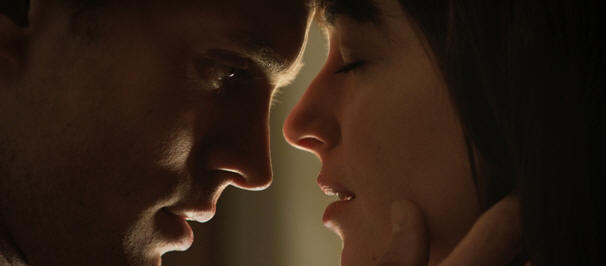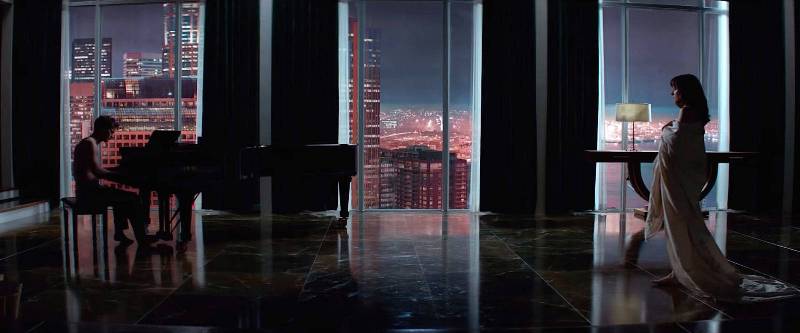MOVIE REVIEWS |
INTERVIEWS |
YOUTUBE |
NEWS
|
EDITORIALS | EVENTS |
AUDIO |
ESSAYS |
ARCHIVES |
CONTACT
|
PHOTOS |
COMING SOON|
EXAMINER.COM FILM ARTICLES
||HOME

Friday, February 13, 2015
MOVIE REVIEW Fifty Shades Of Grey
Power. Possession. Permission. Pleasure.
Persecution.

No body
double. Objectification. Power. Agency. Domination. Submission. Oppression. A
shot from "Fifty Shades Of Grey", directed by Sam Taylor-Johnson.
Universal/Focus
by
Omar P.L. Moore/PopcornReel.com
 FOLLOW
FOLLOW
Friday,
February 13,
2015
You want *him*. You want him inside you. You're
curious. The marketing of Sam Taylor-Johnson's drama "Fifty
Shades Of Grey" uses this train of thought. E.L. James's mega best-selling
book is the cherry on top of all that action. Women bought Ms. James's
book more than 100 million times over. The societal culture surrounding Ms.
Taylor-Johnson's film, not a bad film actually, is the very ingredient its
advertising strategy taps into. But this ambivalent, alluring film of push-and-pull
power dynamics between a seemingly powerless poor woman and a powerful rich man
doesn't go there or truly explore the Grey areas. It's the
I-know-you-want-it "Blurred Lines" refrain without the blurred lines.
You want it, but you really don't, America.
Decorous, cool and ornate -- all initiation without ingratiation, "Fifty Shades
Of Grey" is about control, empowerment, possession and the fantasy of
submission. The truth of abuse lurks around the edges, which are often
absent from this shiny surface just north of titillation. The fantasy
indulged is one of experience without real exploration. Just a taste will
do, says Reel America (aka Ms. Taylor-Johnson and "Shades" screenwriter Kelly
Marcel), while Real America historically says otherwise. The purchases of
Ms. James's reputedly much harsher book (and
Robin Thicke's 2013 rape-culture cheerleading smash-mega
hit "Blurred Lines" (unrated video) indicates something far more
deeply truthful and troubling about America, "Fifty Shade's" constituents and
both men's and women's tacit or explicit approval of women's submission to male
domination.
The shades of Grey are the blank-slated, self-assured Christian Grey (Jamie
Dornan), a multi-millionaire businessman powerbroker who owns a tall building in
Seattle. The cheeky metaphors abound early on as the bland, overawed
journalist Anastasia Steele (Dakota Johnson) looks up at a towering erect
structure in the sky. She's already melted into wetness by the time she
reaches its top floor, tripping over (why?) at the sight of Christian.
(Every woman in a Hollywood romantic comedy seems to trip on a banana peel or a
variant thereof.
Yet this is no comedy, though the raucously-amped audience I was with laughed
nervously throughout.)
Anastasia asks Christian several questions, including whether Ms. Grey is gay.
Perhaps she mispronounced his last name. Before long, the mysterious Mr.
Grey, and men often don't ask many questions of women, is at least curious about
Anastasia, who can't pronounce anything except orgasmic rain by the time she's
left the phallic-shaped building. On cue, the rain falls from Seattle's
Emerald skies. Anastasia has surrendered. Game, set and (fucking)
match.
Not quite. Anastasia plays the mind game and physical maneuvers of captor
and captive reasonably well, acquiring a sense of self and agency but not before
Grey has his way, with her consent. But how does Anastasia really give
consent in a male-dominated world in which she as a woman has unequal bargaining
power to begin with? In this respect Ana, as she likes to be called, is
dominated twice: once by the male world around her, and throughout, singularly by Christian, who
has drawn up the terms upon which the sex and domination contract bind her (no
pun intended.) No lawyer has apparently prepared it. It's all
Christian's architecture, he, a big bad and abused wolf looking to eat and beat.
Ana is little Red Riding Hood, and she's ridden. Like a racehorse.
Christian is sheltered, petulant, possessive. He wants his female toy but
can't always have her. It's farcically dishonest that he doesn't even so
much as raise a hand to her. The
young boys of Steubenville and college campuses
full of men and
do-nothing university officials and trustees would even blush at
this blatant gloss over.
Their contract of engagement by the way, includes such things as allowing the
male dominant to choose the female submissive's contraception at (a type and a place
of) his choosing. You can't help but think of male society's
larger reordering and policing of a woman's reproductive rights. When I
saw and heard Christian's contract I immediately thought of
Hobby Lobby,
the privately-held American non-profit company owned by Christians.
Hobby Lobby is a company
the U.S. Supreme Court in June 2014 ruled (by a 5-4
majority, all men in that majority too) couldn't be forced to cover
contraception costs for its employees over its own
"religious objections".

Who has the power here? Jamie Dornan as Christian
and Dakota Johnson as Anastasia in "Fifty Shades Of Grey", directed by Sam
Taylor-Johnson.
Universal/Focus
Ana and Christian are, for all intents and purposes, employee and employer.
Which would make their engagements, even if consensual, a form of sexual
harassment. His employees all women, know of his propensities ("I trust my
coworkers with only what I choose to tell them"), which could constitute hostile
work environment sex harassment. Christian is decidedly the boss.
It's his company. His office. His building. His bedroom. Heck, he owns the
whips, handcuffs and chains. Slavery. Enslavement. Ana is the
lowly subordinate. Her only union delegate is the audience, which is
likely too busy indulging in and projecting its own prurience and vicarious
fantasies upon Ana and/or Christian.
As such, Ana is left on her own, hung out to dry by all of us, in full-blown
"Compliance"-style. This time
the audience doesn't leave
the theater at the quasi-violations of a woman. The audience
cheerleads, silently assents to or welcomes them. We inevitably luxuriate
on Ana's nakedness, vulnerability, pleasure (and our) fantasy or (her peril.)
From a legal standpoint the contract, drawn up at Christian Grey's office,
inherently connotes coercion. If Ana tripped over in Christian's office
near the film's start, how tripped up is she now?
The film's red lighting
(by cinematographer Seamus McGarvey) during the contract negotiations, which are played for laughs at times, could
connote either a huge throbbing red light telling Ana to stop and strongly
recommend that Christian cease and desist, or big red light district.
Guess which it ends up being? The contract isn't so much signed as it is
implied, as is the audience's voyeurism, indelibly begged for in the camera's
lavish movements and objectifying gaze on Anastasia. Anything Christian is
just that -- Christian, quick and nothing-to-see-here. (Not that I wanted
to. But I'm sure many women and some men did.)
Still, Ms. Taylor-Johnson's film is not truly about sex but rather the
parameters of how power is policed and circumscribed between men and women in a
man's world. The film on a baseline level raises unspoken truths, dilemmas
and the problematic patriarchy of contractual engagements of women and men,
dating and sexual roles. Courts in America have ruled on these matters,
notably on
companionship (see Lee Marvin's case) and living arrangements, the
kind Christian is furiously rigid about. "I don't sleep with anyone", he
curtly insists to Ana, who wants to help Christian out of his barren power
shell. Ana, who only wants love -- "let me touch you" -- wants to help a
damaged man. There's a semblance of deference "Fifty Shades" gives Ana,
and it's often for the express purpose of reviving and saving a tortured man.
Ana stays true to the damaged Mini she drives. She doesn't want new
materials, she only wants an old reliable soul. She seeks that in this
man. Ana cannot see past him. Christian cannot see past her.
Ms. Johnson is very good here as a coy, sophisticated woman who assents but when the time comes she does the audience's and Ms. James's bidding.
Mr. Dornan has little to do except pull down his pants, whip a poor Seattle
girl's behind and enter his submissive. Christian's day job becomes his
night job. Mr. Dornan's face is often transfixed in placidity, either
because Christian is suffering internal pain or because he's an unloving slate
with barely risible emotion. Something is eviscerated in him.
"Fifty Shades", in an act of profound cowardice, stops short of delving deeper,
into issues of rape, domestic violence and property. The continuum and
line between fantasies, pleasures, BDSM and abuse, violence and rape is cut
short. We're merely teased, not tormented. We should have been both.
Christian is indicted but not convicted. He still has his Escala
Penthouse. The 16 women including Ana that Christian has introduced his
tastes to will become 17, then 1700 (how many of them will be Ms. James's book
buyers and Ms. Taylor-Johnson's filmgoers?) Christian will ride again.
And again. And again. Is Super Bowl rape around the corner?
The societal culture of violence gets fetishized in "Fifty Shades" and let off
the hook.

Blurred Girl, Obliterated, Interrupted: Emily Ratajkowski
and Robin Thicke in the 2013 hit video "Blurred Lines".
RobinThickeVEVO
The way "12 Years A Slave"
dealt unblinkingly with torture, physical possession, rape and violence against
the Black body is the way "Fifty Shades Of Grey" should have approached male
dominance of and physical, sexual abuse of women. If it had, Ms.
Taylor-Johnson's film would be daring. That film would probe and
unsettle. But sadly, and not surprisingly, that doesn't happen here.
America cannot be trusted to handle that film. At least not Hollywood's
America. There's a thin line between the behavior in
Steve McQueen's
film and Sam Taylor-Johnson's. That behavior -- of violence and subjugation
is a theme -- but without the auctions, families ripped apart and
excessive death and murder. The time periods are the only difference.
The country is the same as are the oppressors.
The default to any further exploration of Christian stops at his two
most-oft-stated refrains: "this is the way I am" (the only real allusions to
abuse, and the cigarette burns on his toned physique, which he explains) and "I
want you. I want this," which he tells Ana. "Open your mind,"
Christian implores Ana, who has severe reservations about some of the more
extreme tie-me-up-tie-me-down elements of his peccadilloes. What's
interesting is that Christian's refrain is ironic, as his mind is narrowly set
on one thing: dominating and controlling Ana. "This is what I want," this lonely
troubled soul says, with desperation in his voice.
The film narrows and reduces the dictates of a woman's sexuality by pretending
or orchestrating that Ana somehow doesn't have limitless sexual desires or a
sexual imagination of her own. Ms. Taylor-Johnson and Ms. Marcel take the
cop-out route, making Ana a virgin, a Puritanical template (old America), one
that will eventually repudiate Christian with one word and no fingers tied
or crossed behind the back. BDSM isn't necessarily indicted though, and the audience
is surely aware of the "appropriate" sites where it can be found online.
One woman in the audience -- she was a complete stranger --
mentioned this BDSM kink
website to me without any prompting. The audience in San
Francisco was sexually charged up, which is what the "Fifty Shades" marketers at Universal Pictures are counting on everywhere. Submitting to sexual
pleasures and expectations. Yet if you are expecting or going in order to
see lots of sex you will have a long, hard two hours.
"Fifty Shades Of Grey" suggests that a village of abuse and dysfunction
must be burned in order to save it. Ana is both the match and the
salvation. She must save herself. "Show me the very worst," she
demands of the friendless Christian, who jets off to orgasmic orbit at the chance. It's
the one moment his facial expression breaks. He has barely blinked his
eyes throughout. By this time Kate (Eloise Mumford), Ana's roommate, has
already been enjoying a fulfilling and ordinarily loving relationship with
Taylor (Max Martini), a bodyguard for Christian who is one strange companion.
There are true notes, to the film's credit, and numerous false ones, including
the dismissive look at one type of sexuality and identity (gay) while
cheerleading another type (white hetero). "Fifty Shades" champions
heterosexuality while trampling gay identity in one small line of dialogue that
hit my straight gut: "I heard that he was gay," Ana says, when two fawning
fellow graduates drool over Christian, whom, hey presto! is the commencement
speaker at Ana's college.

Opulence, loneliness and fantasy: Jamie Dornan as
Christian and Dakota Johnson as Anastasia in "Fifty Shades Of Grey".
Universal/Focus
Ana uses a "gay" passport, for lack of a better word, to selfishly dampen the
two other women's desires for Christian while expediently and shamefully
trampling gays, who are the film's blind spot of invisibility. The effect
is denigration. A disarming and displacement of the straight male marauder
and his would-be suitors or potential admirers. Earlier, Ana has
apologized for asking if Christian is gay. It's at best puzzling, though
in line with the American rearguard Puritanical order -- and indicative of whose sexuality
is cherished, cheer-led and celebrated most in the American pecking order.
It isn't Ana's.
Ana's sexuality is trampled by Christian. She
literally bends to his will. And is spanked for it. Either that is
sexy to you, unfazing or off-putting. (Strangely it felt neutral and detached for my
purposes.) In the throes of Ana's sexual pleasure and release she is still
constricted, even if liberated from virginity and innocence, delivered in a
quickie. Freedom from being tied down by Christian's dictates however, is Ana's true passport.
For example, in "Fifty Shades" there's no Black man to be seen (aside from a
blurred image of a professor half out of the frame early on.) Black male sexuality (absent from most all Hollywood films to this day) would have
surely threatened and/or enticed many of the hyper-sexed audience that I
attended the screening with. When Jose (Victor Rasuk), a Latino student who's known Ana
for years, has in a drunken state confessed his wanting Ana, who is also drunk,
the brooding, angry stranger Christian becomes bystander defender of Ana's
honor, only to dominate her a few scenes later.
The above scenario is precisely the fantasy
many in the (mainly women's) audience wants. The flawed, cold, rich
stranger, whose dangerous undercurrents rage within. The one man whom the
audience wants to be taken and dominated by six ways to Sunday. Not
exactly like the suave, cavalier Robert Redford in "Indecent Proposal".
Does "Fifty Shades Of Grey" showcase domination of a woman? Yes. Of
course it does, and lingers in close-ups of Ms. Johnson's impeccable body.
Her full-frontal nudeness is on full display for your bulging eyeballs: a body
you can bounce cherries and slither ice-cubes off, close-ups of her breasts,
showings of pubic hair, the whole 69 yards, while the double-standard of
Christian's nether-regions are, surprise, surprise, nowhere to be seen.
(That "other" contract, presumably Mr. Dornan's contract as an actor, likely
kept it from happening.) There's no "male gaze" in Ms.
Taylor-Johnson's film but at the end of the day
"Fifty Shades Of Grey" operates in the ambit of a male-dominated "Blurred Lines"
I-know-you-want-it-good-girl rape fantasy culture. Here, Anastasia is that
good girl.
Often shallow -- and more so via a sometimes playfully naive Anastasia -- "Fifty
Shades" operates from an inherently unequal proposition towards its female
protagonist, and the balance isn't so much reached as it is whispered. Yet
Anastasia is tasted, sampled and enjoyed like a full-course five-star meal and
serving platter, even as the film's duplicitous default is to retreat and
condemn its glassy, faux-nice guy hero. It's a double-sided, somewhat
backhanded repudiation: Ana gets to assert, and refreshingly so, her autonomy
and agency against a dominating man, which in itself has a power and control that
frustrates Christian, but by then the damage to Anastasia, and perhaps the
entertained and satisfied audience, has already been done.
Also with: Jennifer Ehle, Marcia Gay Harden, Luke Grimes, Dylan Neal, Rita Ora,
Callum Keith Rennie.
"Fifty Shades Of Grey" is rated R by the Motion Picture Association for
strong sexual content including dialogue, some unusual behavior and graphic
nudity, and for language. Its running time
is two hours and five minutes.
COPYRIGHT 2015. POPCORNREEL.COM. ALL RIGHTS RESERVED.  FOLLOW
FOLLOW
MOVIE REVIEWS |
INTERVIEWS |
YOUTUBE |
NEWS
|
EDITORIALS | EVENTS |
AUDIO |
ESSAYS |
ARCHIVES |
CONTACT
| PHOTOS |
COMING SOON|
EXAMINER.COM FILM ARTICLES
||HOME
 FOLLOW
TWEET
FOLLOW
TWEET

 FOLLOW
FOLLOW